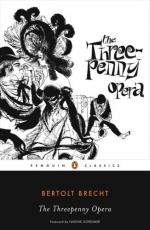|
This section contains 1,812 words (approx. 5 pages at 400 words per page) |

|
Hamilton is an English teacher at Cary Academy, an innovative private school in Cary, North Carolina. In this essay she examines the social constructs of Brecht's revisions to The Beggar's Opera and how these revisions played into his political ideals.
When a writer revises and adapts an earlier work, as Bertolt Brecht did with John Gay's The Beggar's Opera (1728), they make revisions that are consistent with a particular aesthetic and ideology. These shifts are part and parcel of the thinking of that writer's age—an attempt to bring the older work into a contemporary frame and make it meaningful to modern audiences. For example, some late-twenueth-century adaptations of Shakespeare's Hamlet emphasize the tangled feelings between Hamlet and his mother Gertrude, indicating this age's acceptance of Freudian Oedipal concepts (sexual attraction between mother and son). Much of the criticism written on The Threepenny Opera has centered on...
|
This section contains 1,812 words (approx. 5 pages at 400 words per page) |

|




